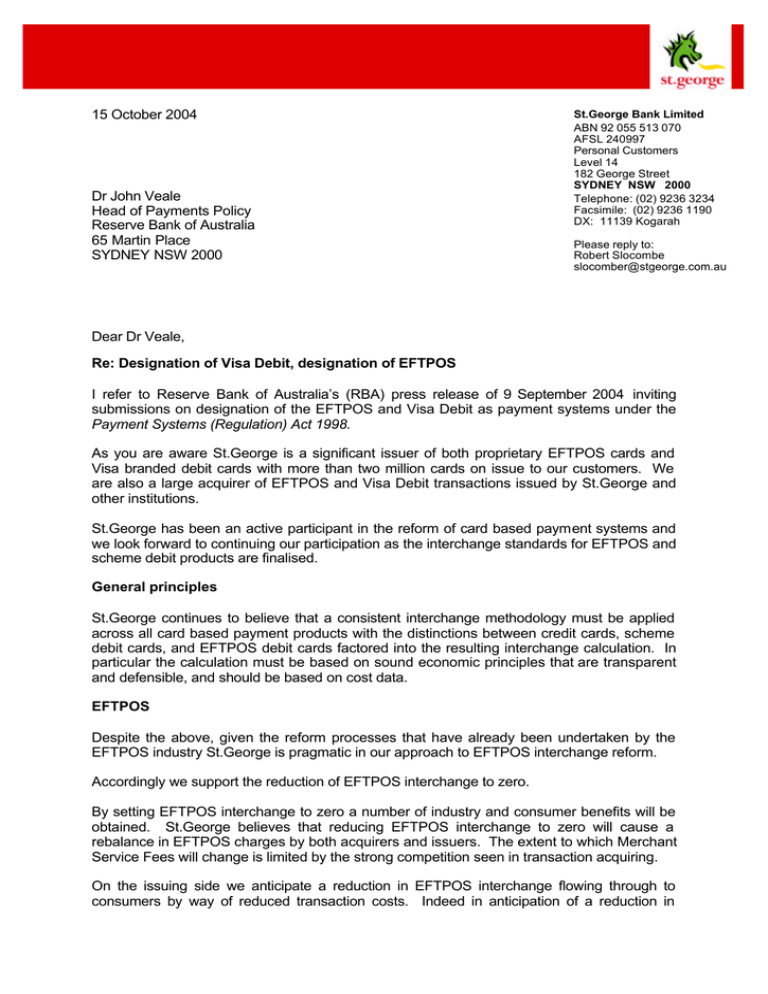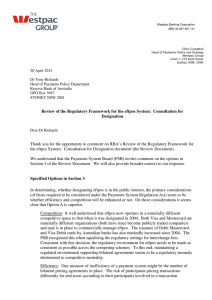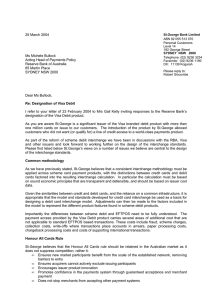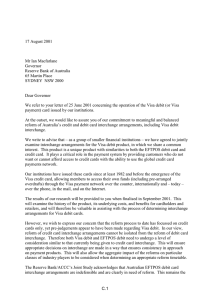15 October 2004 Dr John Veale Head of Payments Policy
advertisement

15 October 2004 Dr John Veale Head of Payments Policy Reserve Bank of Australia 65 Martin Place SYDNEY NSW 2000 St.George Bank Limited ABN 92 055 513 070 AFSL 240997 Personal Customers Level 14 182 George Street SYDNEY NSW 2000 Telephone: (02) 9236 3234 Facsimile: (02) 9236 1190 DX: 11139 Kogarah Please reply to: Robert Slocombe slocomber@stgeorge.com.au Dear Dr Veale, Re: Designation of Visa Debit, designation of EFTPOS I refer to Reserve Bank of Australia’s (RBA) press release of 9 September 2004 inviting submissions on designation of the EFTPOS and Visa Debit as payment systems under the Payment Systems (Regulation) Act 1998. As you are aware St.George is a significant issuer of both proprietary EFTPOS cards and Visa branded debit cards with more than two million cards on issue to our customers. We are also a large acquirer of EFTPOS and Visa Debit transactions issued by St.George and other institutions. St.George has been an active participant in the reform of card based payment systems and we look forward to continuing our participation as the interchange standards for EFTPOS and scheme debit products are finalised. General principles St.George continues to believe that a consistent interchange methodology must be applied across all card based payment products with the distinctions between credit cards, scheme debit cards, and EFTPOS debit cards factored into the resulting interchange calculation. In particular the calculation must be based on sound economic principles that are transparent and defensible, and should be based on cost data. EFTPOS Despite the above, given the reform processes that have already been undertaken by the EFTPOS industry St.George is pragmatic in our approach to EFTPOS interchange reform. Accordingly we support the reduction of EFTPOS interchange to zero. By setting EFTPOS interchange to zero a number of industry and consumer benefits will be obtained. St.George believes that reducing EFTPOS interchange to zero will cause a rebalance in EFTPOS charges by both acquirers and issuers. The extent to which Merchant Service Fees will change is limited by the strong competition seen in transaction acquiring. On the issuing side we anticipate a reduction in EFTPOS interchange flowing through to consumers by way of reduced transaction costs. Indeed in anticipation of a reduction in issuer costs St.George has increased the fee-free transaction limit on our popular Freedom transaction account by adding an additional 24 fee-free transactions per annum 1. Importantly St.George believes EFTPOS interchange should be set to zero and not be abolished - in the future there may well be valid reasons (for example the implementation of enhanced functionality) for the reintroduction of a multilaterally set EFTPOS interchange fee. EFTPOS access The Australian Payments Clearing Association (APCA) is currently developing an EFTPOS access regime. St.George supports the process of voluntary reform to access arrangements as we believe the process will deliver an appropriate balance for both access providers and access seekers. However this process does require the adoption of a standardised interchange fee to remove the negotiation of interchange fees as a barrier to entry. Visa (scheme) debit Given the similarities between credit and scheme debit cards, and the reliance on common infrastructure, we believe it is appropriate that the model and standards developed for credit card interchange be used as the basis for the scheme debit card interchange model. Appropriate adjustments can then be made to the factors included in the model to represent the different product features found in scheme debit products. Importantly the differences between scheme debit and EFTPOS need to be fully understood. The payment access provided by the scheme debit product carries several areas of additional cost that are not applicable to standard EFTPOS based transactions. These costs include fraud, scheme charges, collection costs, write-offs where transactions place accounts in arrears, paper processing costs, chargeback processing costs and costs of supporting international transactions. It is also appropriate that the cost of providing additional fraud mitigation services is included in the standard. When considering the implications of a scheme debit interchange model it is vital the RBA examine the potential for customers converting their current scheme debit card into a credit card. Internal St.George analysis indicates significant numbers of customers would be eligible for a credit product and should they switch (due to pricing or other signals) it is possible that a proportion of these customers could incur increased personal debt through changed spending patterns. Product differentiation St.George fully supports the RBA recommendation that the Visa Debit product is clearly identified at the point of sale. As you are aware St.George already has unique BIN identifiers for our scheme debit portfolios, and we will continue to work with Visa and other issuers to ensure the product design standards reflect the distinction of the Visa Debit card from both Visa Credit and standard EFTPOS cards. Honour All Cards and Surcharging St.George believes that the Honour All Cards rule should be retained in the Australian market as it does not suppress competition, rather it: • Ensures new market participants benefit from the scale of the established network, removing barriers to entry • Ensures acquirers cannot actively exclude issuing participants • Encourages issuer product innovation 1 Freedom account conversion June 2003, Fee-Free limit increased from 8 transactions per month to 10 transactions per month • • Promotes confidence in the payments system through guaranteed acceptance and merchant payment Does not stop merchants from accepting other payment systems The Honour All Cards issues identified from the US Wal-mart case are not directly relevant in Australia as competition law differs substantially between the two countries and product penetration, level of scheme debit interchange and the availability of competing payment systems are also vastly different. To assist in retention of the Honour All Cards rule St.George does not oppose the introduction of a surcharging standard. However, in the spirit of interchange reform, the surcharging standard should ensure that a surcharge levied by a merchant reflects the cost of accepting that card and is fully disclosed to customers at the time of transaction. Further the standard should ensure that retailers and other merchants offering competing payment systems do not use surcharging as a method to recruit consumers to their own product. Timing St.George supports the concurrent introduction of interchange standards for EFTPOS and scheme branded debit products. However, to ensure an equitable outcome to all participants, a transition period is required to ensure that the full benefits of reform are realised. In particular, it is vital that all issuers are able to meet the technical and customer communication requirements of reform within the given timeframes, that any interchange reductions are actually transferred from acquirers to merchants and customers, and that any required merchant education regarding card identification can be undertaken. Conclusion St.George supports the introduction of zero interchange for EFTPOS transactions and a modified credit card standard for scheme debit transactions. We look forward to further discussions with the Reserve Bank regarding the design of the interchange standards and access regime for scheme debit and EFTPOS. The outcome of these deliberations has significant impact on both St.George and our customers and we welcome a timely resolution of any outstanding items. Yours sincerely Robert Slocombe Head of Deposits & Electronic Channels cc. Andrew Thorburn, Group Executive, Personal Customers cc. George Beatty, General Manager, Consumer Product Group



